Around the world on a Vespa: The ‘no-plan’ nomadic life
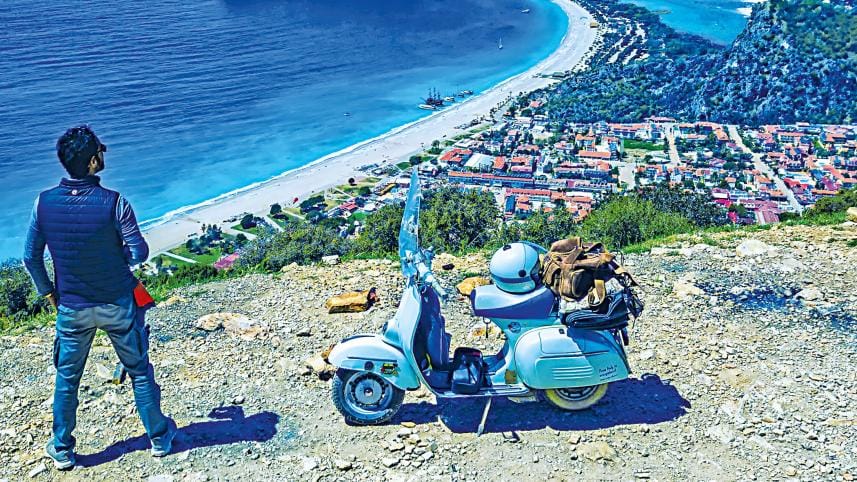
For those of us wedded and welded to our routine-ruled existences, there is an almost jealous fascination about people like Vespanda Ilario Lavarra.
And of course, there are many more of us than there are those like him. We are in the vast majority because the human mind seems to have (d)evolved past the age-old practice of nomadic wandering. But a small minority finds richness and something approaching true freedom in the nomadic ways of old.
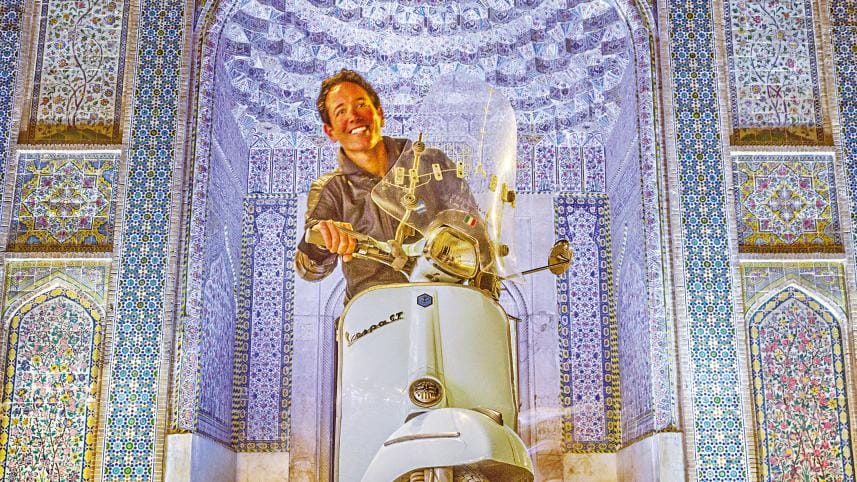
We take stories like Vespanda's as fantasies. People who have traversed large swathes of the world on bicycles or on foot, or sailed seas alone on sailboats, or gotten on a Vespa almost six years ago, and did not look back. Or maybe they look back, but the desire to look ahead is greater.
Most of the time, these are stories we hear about from others, see on YouTube, read about in travel articles.
This is the reason I travel with my Vespa, because at 60kmph you can escape nothing. You cannot escape from your fears, you cannot escape from the sun, you cannot escape from the rain.
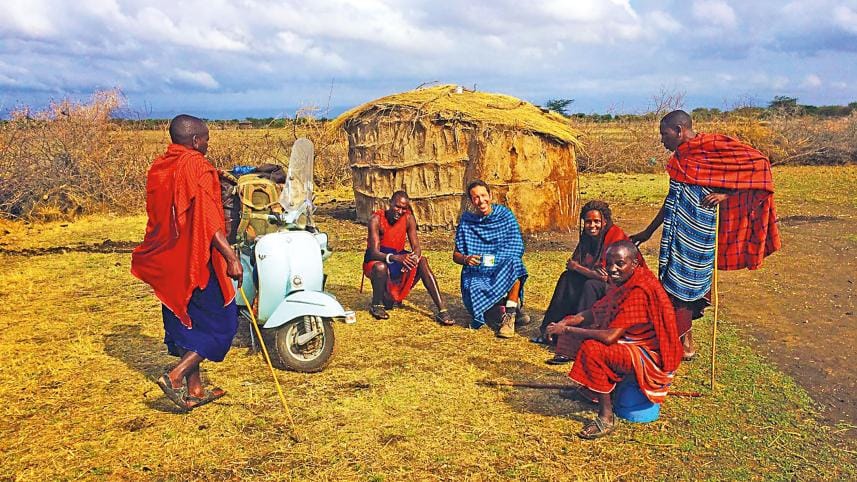
When brought face to face with such an individual, however, the sense of detached wonderment gives way to genuine curiosity, much like suddenly discovering that actual people are enacting the scenes behind the screen of a movie hall in real time, and that along with the glamour, the bruises are real.
When Vespanda was last home in Milan, Donald Trump was still president of the US, the Big Five were a big thing in Bangladesh cricket, Ukraine was only metaphorically in Vladimir Putin's crosshairs, and the term "global pandemic" was associated with something that happened a 100 years ago.
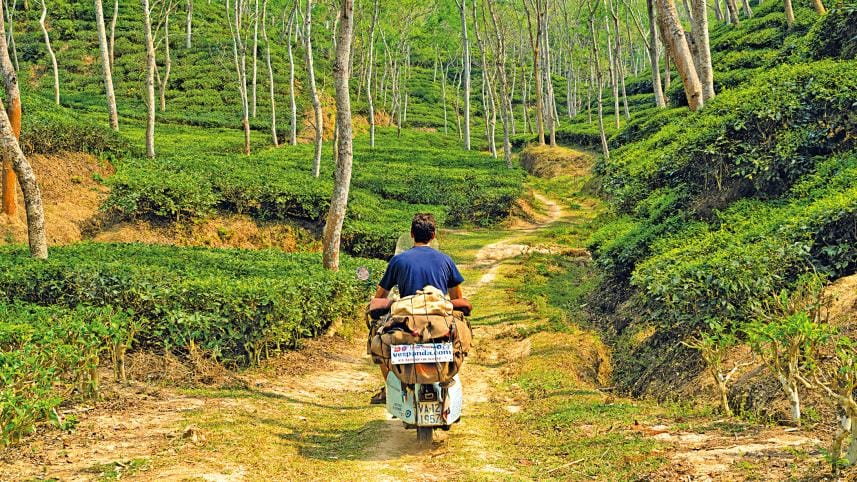
Since September 16, 2017, Vespanda has been on his 1968 Vespa and gone to Norway, then down to Spain, down and up the continent of Africa, into Turkey, the middle east, and central Asia. Recently he came to Bangladesh, the 97th country on this most epic of journeys. He entered through Satkhira, and over more than 40 days went to Barishal, Kuakata, Cox's Bazar, Saint Martin's Island, Dhaka, and Sylhet before going back through the capital to Satkhira and back into India.

"I had a degree in economics and worked in an office, but this was not my goal in life," Vespanda said during the interview with The Daily Star. "My goal is to travel as much as I can, enjoy my life as much as I can. So, I put together my two passions -- travelling and Vespas.
"This is the second long journey because 10 years ago I was in the Americas. I travelled for almost two years [on another Vespa that is now in a museum in Italy]. From New York to Alaska, then to Argentina and back to New York again. Twenty-one countries, and 82,000km.
"When I came back from this long journey, I went back to work and I decided, with my savings, I would visit the rest of the world."
The question was inevitable. What would a "normal" person need to do to just start on a journey like his?



"The most important preparation is not physical. The most important preparation is mental. Because you have to face a lot of bad situations on your journey. So, if you are not well-trained mentally, at the first problem you go back home. All your values, your comfort zone, you have to forget them. And for sure, at the beginning, to be reborn from zero is not easy at all … you have to change your point of view of the world, you have to change your habits. You have to change yourself. And when you are ready, you say, let's go around the world, it's a beautiful experience."
But he is quick to remind you that it is not all beauty. There is a lot of pain, both emotional and physical. There is of course the pain of leaving behind friends and family, as well as saying goodbye to friends made on the road.
"This is the most difficult part. To be free … what I read once was, freedom is not free, and that is the point. You have to handle the bonds, you have to handle the good and bad moments, and you have to pay sometimes for freedom.

"I had a girlfriend and we split after I had been on the road for three years. It was 2020, just a few weeks before Covid. It was very painful because I was alone and we had been together for 10 years. But of course, we cannot continue like that," the 40-year-old Italian said with the air of someone who had processed the pain, and gotten back on the Vespa.
During the Covid-19 lockdowns, he was stuck in Iran for eight months, then Turkey for another eight. But he only used those times building friendships and delving into local culture.

He also talked about going through countries where there were ongoing conflicts, and the dangers that held -- from travelling through the jungles of Cameroon in 2017 despite being warned by locals that rebels kill people inside the forest every day, to staying in a police station in Yemen for a week because he could go no farther as there was a war going on.
Going through Africa, he contracted malaria in Angola and recovered in Namibia. He suffered from Typhus fever in Guinea.
"I was in Conakry, Guinea. It is one of the poorest countries in the world. I remember I was very sick, in a lot of pain, in a hospital in that little village. It was a hospital without electricity, with chicken going around the room. In Africa, you are not able to say whether you will be alive tomorrow. In the end, this is my philosophy -- this is my day-by-day life.
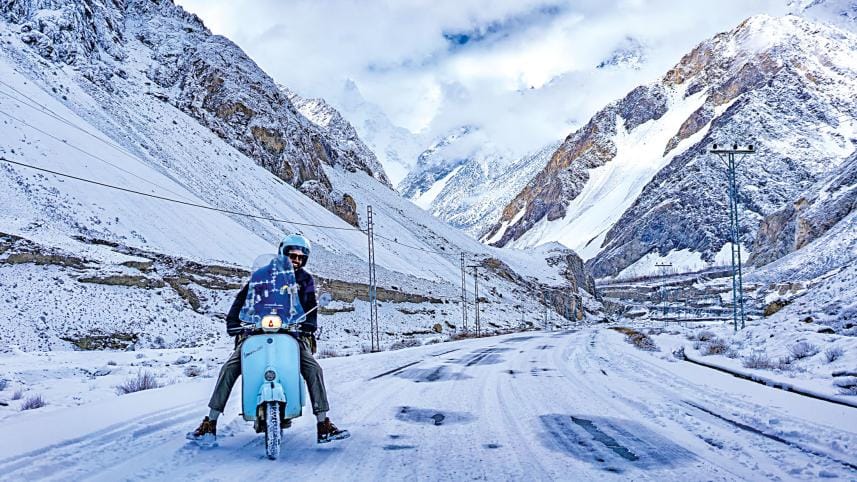
And so, we come to the real reason he does this.
"But the balance is, every day you have new experiences, you meet new people, you enjoy new food, you feel you are living your life. I always say 'one life, live it'. I will go on, carry on as long as the positive is more than the negative. Till my desire of discovering something new is more than my sadness and pain to leave everything behind.
"I don't want to just see the world. I want to get my hands dirty with the world. This is the reason I travel with my Vespa, because at 60kmph you can escape nothing. You cannot escape from your fears, you cannot escape from the sun, you cannot escape from the rain. That's what I want to live… I want to experience every aspect of this world. This is the reason I am travelling low budget [around 10 to 15 euros per day] with this 50-year-old Vespa that has a maximum speed of 60kmph."
He said he chose to travel on Vespas also because he has a passion for the two-wheelers, it's easy to make running repairs and spare parts are available everywhere. As importantly, people love the Vespa and its non-threatening presence, and Vespa lovers, like in the Vespa Club Bangladesh, welcome him with open arms.
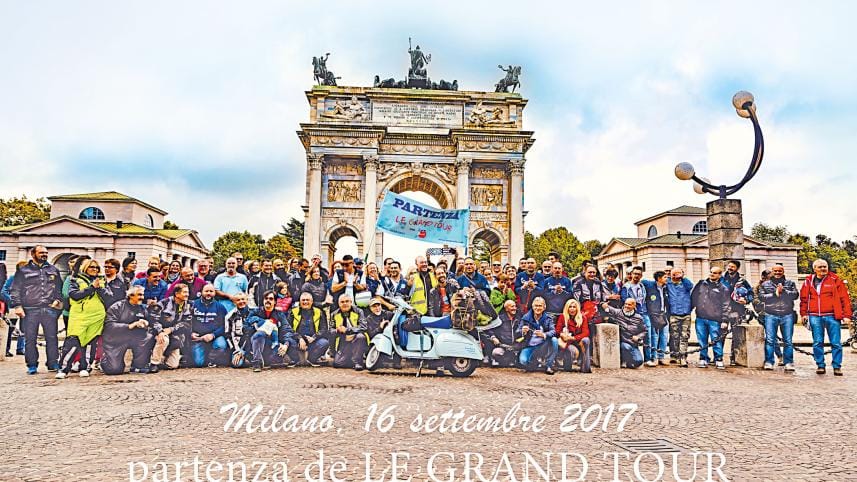
Perhaps it is this near primal urge to be one with the world he travels through that when asked about the most stunning sights he has seen, he does not come up with obvious answers.
"I love the Iguazu Falls [in Argentina], which are huge, but with more levels and they are very impressive.
"Landscapes in general, I really love Bolivia, or the Tajikistan mountains or even north part of Pakistan. This kind of unique, remote areas where you are in the middle of nature.
"I crossed the desert at night in Saudi Arabia because it was May and it was 50 degrees during the day. So, I spent one night crossing 1,000km of desert. Me alone, this dark sky, with these dunes, and this silence. I remember when I switched off my Vespa, there was an airplane high in the sky and I could hear its engine. No sounds all around me, and it was an amazing experience because you are really in touch with the elements, nature and the world."
He has also developed a special place in his heart for Bangladesh. "What surprised me or what I liked most were the paddy fields, it is something unique. Okay, for you maybe it's nothing but for a traveller who comes here and is surrounded by this green ocean of palm trees and these beautiful fields, water, and people dressed in colourful clothes -- these are some of the things that most impressed me.
"And I really loved the tea gardens in Sylhet, and the long beach of Cox's Bazar with these wonderful boats, colourful boats with these strange shapes I have never seen in my life."
Having already crossed 185,000km on this journey, he plans to travel to Australia, then take a flight to the US before circling back to Europe.
Would he then go back home?
To know more about Vespanda's travels, to buy merchandise or support him, visit vespanda.com or look him up on Facebook (Vespanda - Ilario Lavarra), Instagram (@vespanda_ilario.lavarra) or Youtube (Vespanda Ilario Lavarra)
"Mine is a no-plan life. I know this is the most difficult thing for normal people to understand because normal people have schedules from eight in the morning, so you cannot imagine how you can live without a plan. But the only point is you have to live this journey and just follow the flow."
One can only hope that he continues on this incredible journey where beauty and pain go hand in hand and struggle for primacy, and that the positive outweighs the negative for as long as possible.



 For all latest news, follow The Daily Star's Google News channel.
For all latest news, follow The Daily Star's Google News channel.
Comments